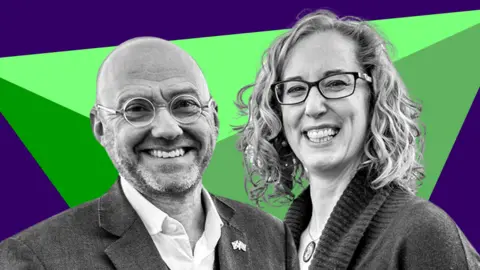Who are Scottish Greens leaders Patrick Harvie and Lorna Slater?
 bbc
bbcPatrick Harvie: The basics
Age: 51
Education: Dumbarton Academy, Manchester Metropolitan University
Parliamentary constituency: MSP for the Glasgow region
Who is he?
Mr Harvie was born into a very political family in Vale of Leven, and was taken to Campaign for Nuclear Disarmament protests from a young age.
After leaving university, he worked within the Gay Men's Project at a sexual health organisation.
Mr Harvie became the first openly bisexual MSP when he was elected to Holyrood in 2003.
He was part of the Yes Scotland campaign ahead of the 2014 independence referendum, and supports the creation of an independent Scottish republic.
What was his route to power?
Mr Harvie became the male co-convener of the Scottish Greens in 2008, following the resignation of Robin Harper.
He held the role until 2019, when the party changed its constitution to create co-leaders instead of co-conveners.
Mr Harvie was elected by party members as one of the co-leaders, with Lorna Slater as the other.
The Greens won eight seats in the 2021 Holyrood election, their most ever, which led to the Bute House power-sharing agreement with the SNP being signed after weeks of talks between the two parties.
The deal saw both Mr Harvie and Ms Slater join the government as junior ministers, with Mr Harvie being given the title of Minister for Zero Carbon Buildings, Active Travel and Tenants' Rights.
The Bute House agreement was scrapped by SNP leader Humza Yousaf in April of this year. The furious reaction by Mr Harvie and Ms Slater led to Mr Yousaf quitting as first minister and being replaced by John Swinney.
Lorna Slater: The basics
Age: 48
Education: Western Canada High School, University of British Columbia
Family: Married to Gordon Craig
Parliamentary Constituency: MSP for the Lothian region
Who is she?
Lorna Slater was born in Calgary in Canada and graduated with a degree in electro-mechanical engineering design at the University of British Columbia in Vancouver.
Shortly after graduating she bought a one-way plane ticket to Glasgow with the intention of spending two years travelling around Europe - but instead remained in Scotland.
Ms Slater became involved in politics during the 2014 referendum, when she campaigned in favour of independence.
She has tweeted about having autism.
What was her route to power?
After standing as a Scottish Greens election candidate on a number of occasions without success, Ms Slater decided to enter the co-leadership contest when the party scrapped its co-convener roles in 2019.
She said she wanted the Greens to have a "fresh new start" and to get more women and non-binary people elected.
After being named co-leader alongside Mr Harvie, she was elected to the Scottish Parliament as an MSP for the Lothian region in 2021.
The Bute House agreement between the Greens and the SNP saw Ms Slater being appointed as the Minister for Green Skills, Circular Economy and Biodiversity.
The role saw her given responsibility for policies including the deposit return scheme and marine protected areas.
Ms Slater left the government following the collapse of the power-sharing deal in April.
What are their key policies?
The Scottish Greens have not yet published their election manifesto, but their main goals include:
- The creation of an independent Scottish republic
- No new licences to drill for more oil and gas in the North Sea, and a managed transition of offshore jobs to green industries
- All peak rail fares to be scrapped across the UK
- Scotland to be nuclear-free
- Opposing any moves to increase the age of accessing "gender affirming care" to 25
What state are the Scottish Greens in?
Despite having had MSPs elected in every election since the Scottish Parliament was created in 1999, there has never been a Scottish Greens MP.
The party has said it will be fielding 44 candidates - far more than in previous general elections.
It would be a major shock if any of these candidates were to be elected, with the party looking to build momentum ahead of the next Holyrood election in 2026.
There had been mounting discontent among some Green activists over the party's involvement in the Bute House agreement, particularly after the Scottish government scrapped some of its climate change targets and the Scottish NHS paused the prescription of puberty blockers.
Green members had been due to vote on whether to continue in the power-sharing agreement but Humza Yousaf decided to end it before the vote happened.
